Fleurs du Mal Magazine


De kaartverkoop van de 37ste Nacht van de Poëzie is van start! De Nacht vindt dit jaar plaats op zaterdag 28 september, als vanouds in de Grote Zaal van TivoliVredenburg.
Tot diep in de nacht krijg je een poëtische marathon voorgeschoteld. Aanstormend talent en grote namen uit de Nederlandstalige dichtkunst worden afgewisseld door muzikale en theatrale entr’actes.

De eerste namen van dichters die optreden tijdens de Nacht zijn bekend: H.C. ten Berge, Gerda Blees, Ellen Deckwitz, Maud Vanhauwaert, Nachoem Wijnberg, Hagar Peeters, Esther Jansma en Breyten Breytenbach zullen het podium betreden. De andere dichters en entr’actes worden in de loop van dit voorjaar aangekondigd. De presentatie is wederom in handen van Piet Piryns en Ester Naomi Perquin.
De Early Bird tickets van 33,- (regulier tarief 38,-) zijn verkrijgbaar tot en met 1 juli. Kaarten zijn inclusief de Nachtbundel 2019. Ook zijn er speciale Nacht-de-luxe kaarten waarbij je een vaste zitplaats kunt reserveren (beperkt aantal beschikbaar).
37ste Nacht van de Poëzie
Zaterdag 28 september 2019
20.00 – ong. 03.00 uur
Grote Zaal | TivoliVredenburg Utrecht
Kindernacht van de Poëzie
Na de succesvolle edities van 2017 en 2018 is er een nieuwe Nachttraditie! In de middag van zaterdag 28 september, aan de vooravond van de ‘grote’ Nacht, vindt dit jaar voor de derde keer de Kindernacht plaats. Poëziefans van zes jaar en ouder kunnen dan samen met hun vriendjes, ouders en familie kijken en luisteren naar voordrachten van geestige gedichten en raadselachtige rijmpjes door bekende dichters. Schrijver, dichter en Drama Koningin Babs Gons presenteert de Kindernacht. En naast alles wat op het podium gebeurt, kunnen kinderen ook deelnemen aan allerlei spannende en leuke doe-activiteiten.
Kindernacht
Zaterdag 28 september 2019
15:00 – 17:00 uur
Pandora | TivoliVredenburg Utrecht
# meer informatie website nacht van de poézie
• fleursdumal.nl magazine
More in: #More Poetry Archives, Art & Literature News, AUDIO, CINEMA, RADIO & TV, Breyten Breytenbach, Nacht van de Poëzie, Peeters, Hagar
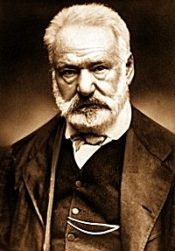
Exil
Si je pouvais voir, ô patrie,
Tes amandiers et tes lilas,
Et fouler ton herbe fleurie,
Hélas !
Si je pouvais, – mais, ô mon père,
O ma mère, je ne peux pas, –
Prendre pour chevet votre pierre,
Hélas !
Dans le froid cercueil qui vous gêne,
Si je pouvais vous parler bas,
Mon frère Abel, mon frère Eugène,
Hélas !
Si je pouvais, ô ma colombe,
Et toi, mère, qui t’envolas,
M’agenouiller sur votre tombe,
Hélas !
Oh ! vers l’étoile solitaire,
Comme je lèverais les bras !
Comme je baiserais la terre,
Hélas !
Loin de vous, ô morts que je pleure,
Des flots noirs j’écoute le glas ;
Je voudrais fuir, mais je demeure,
Hélas !
Pourtant le sort, caché dans l’ombre,
Se trompe si, comptant mes pas,
Il croit que le vieux marcheur sombre
Est las.
Victor Hugo
(1802-1885)
Exil
(Poème)
• fleursdumal.nl magazine
More in: Archive G-H, Archive G-H, Hugo, Victor, Victor Hugo
Sredni Vashtar
Conradin was ten years old, and the doctor had pronounced his professional opinion that the boy would not live another five years. The doctor was silky and effete, and counted for little, but his opinion was endorsed by Mrs. de Ropp, who counted for nearly everything. Mrs. De Ropp was Conradin’s cousin and guardian, and in his eyes she represented those three-fifths of the world that are necessary and disagreeable and real; the other two-fifths, in perpetual antagonism to the foregoing, were summed up in himself and his imagination. One of these days Conradin supposed he would succumb to the mastering pressure of wearisome necessary things — such as illnesses and coddling restrictions and drawn-out dullness. Without his imagination, which was rampant under the spur of loneliness, he would have succumbed long ago.
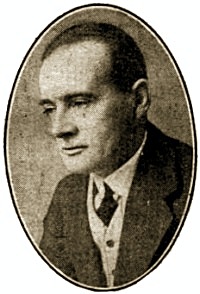 Mrs. de Ropp would never, in her honestest moments, have confessed to herself that she disliked Conradin, though she might have been dimly aware that thwarting him “for his good” was a duty which she did not find particularly irksome. Conradin hated her with a desperate sincerity which he was perfectly able to mask. Such few pleasures as he could contrive for himself gained an added relish from the likelihood that they would be displeasing to his guardian, and from the realm of his imagination she was locked out — an unclean thing, which should find no entrance.
Mrs. de Ropp would never, in her honestest moments, have confessed to herself that she disliked Conradin, though she might have been dimly aware that thwarting him “for his good” was a duty which she did not find particularly irksome. Conradin hated her with a desperate sincerity which he was perfectly able to mask. Such few pleasures as he could contrive for himself gained an added relish from the likelihood that they would be displeasing to his guardian, and from the realm of his imagination she was locked out — an unclean thing, which should find no entrance.
In the dull, cheerless garden, overlooked by so many windows that were ready to open with a message not to do this or that, or a reminder that medicines were due, he found little attraction. The few fruit-trees that it contained were set jealously apart from his plucking, as though they were rare specimens of their kind blooming in an arid waste; it would probably have been difficult to find a market-gardener who would have offered ten shillings for their entire yearly produce. In a forgotten corner, however, almost hidden behind a dismal shrubbery, was a disused tool-shed of respectable proportions, and within its walls Conradin found a haven, something that took on the varying aspects of a playroom and a cathedral. He had peopled it with a legion of familiar phantoms, evoked partly from fragments of history and partly from his own brain, but it also boasted two inmates of flesh and blood. In one corner lived a ragged-plumaged Houdan hen, on which the boy lavished an affection that had scarcely another outlet. Further back in the gloom stood a large hutch, divided into two compartments, one of which was fronted with close iron bars. This was the abode of a large polecat-ferret, which a friendly butcher-boy had once smuggled, cage and all, into its present quarters, in exchange for a long-secreted hoard of small silver. Conradin was dreadfully afraid of the lithe, sharp-fanged beast, but it was his most treasured possession. Its very presence in the tool-shed was a secret and fearful joy, to be kept scrupulously from the knowledge of the Woman, as he privately dubbed his cousin. And one day, out of Heaven knows what material, he spun the beast a wonderful name, and from that moment it grew into a god and a religion. The Woman indulged in religion once a week at a church near by, and took Conradin with her, but to him the church service was an alien rite in the House of Rimmon. Every Thursday, in the dim and musty silence of the tool-shed, he worshipped with mystic and elaborate ceremonial before the wooden hutch where dwelt Sredni Vashtar, the great ferret. Red flowers in their season and scarlet berries in the winter-time were offered at his shrine, for he was a god who laid some special stress on the fierce impatient side of things, as opposed to the Woman’s religion, which, as far as Conradin could observe, went to great lengths in the contrary direction. And on great festivals powdered nutmeg was strewn in front of his hutch, an important feature of the offering being that the nutmeg had to be stolen. These festivals were of irregular occurrence, and were chiefly appointed to celebrate some passing event. On one occasion, when Mrs. de Ropp suffered from acute toothache for three days, Conradin kept up the festival during the entire three days, and almost succeeded in persuading himself that Sredni Vashtar was personally responsible for the toothache. If the malady had lasted for another day the supply of nutmeg would have given out.
The Houdan hen was never drawn into the cult of Sredni Vashtar. Conradin had long ago settled that she was an Anabaptist. He did not pretend to have the remotest knowledge as to what an Anabaptist was, but he privately hoped that it was dashing and not very respectable. Mrs. de Ropp was the ground plan on which he based and detested all respectability.
After a while Conradin’s absorption in the tool-shed began to attract the notice of his guardian. “It is not good for him to be pottering down there in all weathers,” she promptly decided, and at breakfast one morning she announced that the Houdan hen had been sold and taken away overnight. With her short-sighted eyes she peered at Conradin, waiting for an outbreak of rage and sorrow, which she was ready to rebuke with a flow of excellent precepts and reasoning. But Conradin said nothing: there was nothing to be said. Something perhaps in his white set face gave her a momentary qualm, for at tea that afternoon there was toast on the table, a delicacy which she usually banned on the ground that it was bad for him; also because the making of it “gave trouble,” a deadly offence in the middle-class feminine eye.
“I thought you liked toast,” she exclaimed, with an injured air, observing that he did not touch it.
“Sometimes,” said Conradin.
In the shed that evening there was an innovation in the worship of the hutch-god. Conradin had been wont to chant his praises, to-night he asked a boon.
“Do one thing for me, Sredni Vashtar.”
The thing was not specified. As Sredni Vashtar was a god he must be supposed to know. And choking back a sob as he looked at that other empty corner, Conradin went back to the world he so hated.
And every night, in the welcome darkness of his bedroom, and every evening in the dusk of the tool-shed, Conradin’s bitter litany went up: “Do one thing for me, Sredni Vashtar.”
Mrs. de Ropp noticed that the visits to the shed did not cease, and one day she made a further journey of inspection.
“What are you keeping in that locked hutch?” she asked. “I believe it’s guinea-pigs. I’ll have them all cleared away.”
Conradin shut his lips tight, but the Woman ransacked his bedroom till she found the carefully hidden key, and forthwith marched down to the shed to complete her discovery. It was a cold afternoon, and Conradin had been bidden to keep to the house. From the furthest window of the dining-room the door of the shed could just be seen beyond the corner of the shrubbery, and there Conradin stationed himself. He saw the Woman enter, and then he imagined her opening the door of the sacred hutch and peering down with her short-sighted eyes into the thick straw bed where his god lay hidden. Perhaps she would prod at the straw in her clumsy impatience. And Conradin fervently breathed his prayer for the last time. But he knew as he prayed that he did not believe. He knew that the Woman would come out presently with that pursed smile he loathed so well on her face, and that in an hour or two the gardener would carry away his wonderful god, a god no longer, but a simple brown ferret in a hutch. And he knew that the Woman would triumph always as she triumphed now, and that he would grow ever more sickly under her pestering and domineering and superior wisdom, till one day nothing would matter much more with him, and the doctor would be proved right. And in the sting and misery of his defeat, he began to chant loudly and defiantly the hymn of his threatened idol:
Sredni Vashtar went forth,
His thoughts were red thoughts and his teeth were white.
His enemies called for peace, but he brought them death.
Sredni Vashtar the Beautiful.
And then of a sudden he stopped his chanting and drew closer to the window-pane. The door of the shed still stood ajar as it had been left, and the minutes were slipping by. They were long minutes, but they slipped by nevertheless. He watched the starlings running and flying in little parties across the lawn; he counted them over and over again, with one eye always on that swinging door. A sour-faced maid came in to lay the table for tea, and still Conradin stood and waited and watched. Hope had crept by inches into his heart, and now a look of triumph began to blaze in his eyes that had only known the wistful patience of defeat. Under his breath, with a furtive exultation, he began once again the paean of victory and devastation. And presently his eyes were rewarded: out through that doorway came a long, low, yellow-and-brown beast, with eyes a-blink at the waning daylight, and dark wet stains around the fur of jaws and throat. Conradin dropped on his knees. The great polecat-ferret made its way down to a small brook at the foot of the garden, drank for a moment, then crossed a little plank bridge and was lost to sight in the bushes. Such was the passing of Sredni Vashtar.
“Tea is ready,” said the sour-faced maid; “where is the mistress?”
“She went down to the shed some time ago,” said Conradin.
And while the maid went to summon her mistress to tea, Conradin fished a toasting-fork out of the sideboard drawer and proceeded to toast himself a piece of bread. And during the toasting of it and the buttering of it with much butter and the slow enjoyment of eating it, Conradin listened to the noises and silences which fell in quick spasms beyond the dining-room door. The loud foolish screaming of the maid, the answering chorus of wondering ejaculations from the kitchen region, the scuttering footsteps and hurried embassies for outside help, and then, after a lull, the scared sobbings and the shuffling tread of those who bore a heavy burden into the house.
“Whoever will break it to the poor child? I couldn’t for the life of me!” exclaimed a shrill voice. And while they debated the matter among themselves, Conradin made himself another piece of toast.
Sredni Vashtar
From ‘The Chronicles of Clovis’
by Saki (H. H. Munro)
(1870 – 1916)
• fleursdumal.nl magazine
More in: Archive S-T, Saki, Saki, The Art of Reading

In 2019 jubileert Lustwarande. Delirious is de tiende expositie in De Oude Warande en de zesde overzichtseditie, met voor het merendeel nieuwe werken van vijfentwintig internationale kunstenaars.
Delirious
Jubileumeditie
15 juni – 20 oktober 2019
Opening: zaterdag 15 juni om 14.00
 Evenals voorgaande overzichtsedities van Lustwarande presenteert Delirious recente ontwikkelingen in de hedendaagse sculptuur. Die recente ontwikkelingen worden gekenschetst door grote diversiteit. Naast reflecties op actuele thema’s (vloeiende identiteit, migratie, wetenschappelijke innovaties, het veranderende besef over de verhouding tussen mens en natuur, de hyperversnelling van het alledaagse leven als gevolg van nieuwe technologieën en psychologische reacties hierop) is de nadruk die er op materiaal gelegd wordt onmiskenbaar en uiterst opmerkelijk. Dit is voor een groot deel het gevolg van de sterke focus op nieuwe denkmodellen die de laatste jaren in het beeldende kunstdiscours waarneembaar is.
Evenals voorgaande overzichtsedities van Lustwarande presenteert Delirious recente ontwikkelingen in de hedendaagse sculptuur. Die recente ontwikkelingen worden gekenschetst door grote diversiteit. Naast reflecties op actuele thema’s (vloeiende identiteit, migratie, wetenschappelijke innovaties, het veranderende besef over de verhouding tussen mens en natuur, de hyperversnelling van het alledaagse leven als gevolg van nieuwe technologieën en psychologische reacties hierop) is de nadruk die er op materiaal gelegd wordt onmiskenbaar en uiterst opmerkelijk. Dit is voor een groot deel het gevolg van de sterke focus op nieuwe denkmodellen die de laatste jaren in het beeldende kunstdiscours waarneembaar is.
Het is niet verwonderlijk dat dergelijke denkkaders directe invloed hebben op de hedendaagse kunstproductie. De onophoudelijke nadruk die er op het belang van materie gelegd wordt heeft ertoe geleid dat een nieuwe generatie kunstenaars de oude filosofische vraag weer op de voorgrond gesteld heeft hoe materie ons beïnvloed en hoe wij materie beïnvloeden. In de context van voortschrijdende technologie, toenemende digitalisering, alles nivellerende globalisering en noodzakelijke herdefiniëring van ons wereldbeeld, is er hernieuwde aandacht voor de fysieke productie van beelden en voor heronderzoek naar bestaande en nieuwe materialen. Net als midden jaren ’80 van de vorige eeuw staat de huid van sculptuur opnieuw centraal, ditmaal echter in een niet eerder vertoonde mix van combinaties. Metalen, plastic, nieuwe kunststoffen, 3D prints, aarde, pigmenten, textiel, glas, klei, – en terug van weggeweest – hout en marmer en andere steensoorten en gevonden voorwerpen worden scrupuleus geassembleerd en gebricoleerd, veelal met een conceptuele inslag.
 Dit vloeit niet alleen rechtstreeks voort uit bovengeschetste nieuwe theoretische modellen maar ook uit de fundamenteel veranderde eigenschappen van de hedendaagse beeldcultuur, die bijna vloeiend geworden is, uit de toenemende huidige mengmogelijkheden en uit de drang om die zowel digitaal als fysiek verder te onderzoeken, wat gepaard gaat met de noodzaak alle mogelijkheden opnieuw onder de loep te nemen, fysiek en ideologisch. En niet in de laatste plaats doordat kunstenaars een toenemende neiging ervaren zich van het beeldscherm af te wenden om weer in contact te komen met fysieke materialen. Of de kunstenaar het werk eigenhandig maakt of uitbesteedt aan producenten is daarbij van geen belang. De titel Delirious verwijst naar deze hang naar een hernieuwde fysieke sculptuurpraktijk, die zowel ongebreideld euforisch is als ook kritisch reflecterend.
Dit vloeit niet alleen rechtstreeks voort uit bovengeschetste nieuwe theoretische modellen maar ook uit de fundamenteel veranderde eigenschappen van de hedendaagse beeldcultuur, die bijna vloeiend geworden is, uit de toenemende huidige mengmogelijkheden en uit de drang om die zowel digitaal als fysiek verder te onderzoeken, wat gepaard gaat met de noodzaak alle mogelijkheden opnieuw onder de loep te nemen, fysiek en ideologisch. En niet in de laatste plaats doordat kunstenaars een toenemende neiging ervaren zich van het beeldscherm af te wenden om weer in contact te komen met fysieke materialen. Of de kunstenaar het werk eigenhandig maakt of uitbesteedt aan producenten is daarbij van geen belang. De titel Delirious verwijst naar deze hang naar een hernieuwde fysieke sculptuurpraktijk, die zowel ongebreideld euforisch is als ook kritisch reflecterend.
Deelnemende kunstenaars
Isabelle Andriessen (NL)
Nina Canell (SE)
Steven Claydon (UK)
Claudia Comte (CH)
Morgan Courtois (FR)
Hadrien Gerenton (FR)
Daiga Grantina (LV)
Siobhán Hapaska (IR)
Lena Henke (DE)
Camille Henrot (FR)
Nicholas Hlobo (SA)
Saskia Noor van Imhoff (NL)
Sven ’t Jolle (BE)
Sonia Kacem (CH)
Esther Kläs (DE)
Sarah Lucas (UK)
Justin Matherly (US)
Win McCarthy (US)
Bettina Pousttchi (DE)
Magali Reus (NL)
Jehoshua Rozenman (IL/NL)
Bojan Šarčević (FR)
Grace Schwindt (DE)
Eric Sidner (US)
Filip Vervaet (BE)
 Publicatie
Publicatie
DELIRIOUS LUSTWARANDE – EXCURSIONS IN CONTEMPORARY SCULPTURE III
Ter gelegenheid van Delirious geeft Lustwarande in dit jubileumjaar de publicatie DELIRIOUS LUSTWARANDE – EXCURSIONS IN CONTEMPORARY SCULPTURE III uit. Naast documentatie van de werken in deze expositie wordt tevens documentatie van alle werken in de voorgaande vier edities (Hybrids (2018), Disruption (2017), Luster (2016) en Rapture & Pain (2015)) opgenomen. De vijf exposities samen geven een helder beeld van de stand van zaken in de hedendaagse sculptuur.
Om de exposities en de werken van een bredere context te voorzien, heeft Lustwarande drie auteurs uitgenodigd om speciaal voor deze publicatie een essay te schrijven: Dominic van den Boogerd, kunstcriticus en coördinator artistieke begeleiding en research bij De Ateliers, Amsterdam, Johan Pas, kunsthistoricus, auteur en hoofd Koninklijke Academie voor Schone Kunsten, Antwerpen, Domeniek Ruyters, kunsthistoricus en editor in chief Metropolis M, Utrecht
Locatie: park De Oude Warande
Bredaseweg 441
Tilburg
•Chris Driessen
artistiek directeur
•Heidi van Mierlo
zakelijk directeur
# meer informatie website lustwarande
• fleursdumal.nl magazine
More in: - Book News, - Book Stories, Art & Literature News, Art Criticism, Dutch Landscapes, Exhibition Archive, Fundament - Lustwarande, Sculpture
`Ken jij dat verhaal nog, over die koopman?’ vraagt Mels. `Het verhaal dat de juf voorlas?’
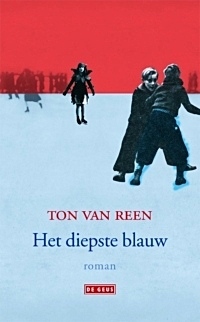 `Ik ken het nog’, zegt Tijger. `Het verhaal van de man in het zwart, die als een koopman langs de huizen ging. Als de mensen aan de deuren kwamen, lichtte hij zijn hoed, zodat ze de horentjes op zijn hoofd zagen.
`Ik ken het nog’, zegt Tijger. `Het verhaal van de man in het zwart, die als een koopman langs de huizen ging. Als de mensen aan de deuren kwamen, lichtte hij zijn hoed, zodat ze de horentjes op zijn hoofd zagen.
Niemand durfde de duivel te weigeren iets van hem te kopen. Maar wat hij te koop aanbood, maakte hen bang. Het waren lege zakken, lege dozen en holle vaten met niks erin. Voor veel geld had je niks gekocht. De duivel verkocht alleen maar lucht. Daar betaalden de mensen voor, uit angst door hem te worden meegenomen. De duivel was de patroon van de kooplui, hun leermeester en hun voorbeeld.’
`Precies, zo ging dat verhaal’, zegt Mels. `Vroeger kende ik het vanbuiten.’
`Daarin was jij beter’, geeft Tijger toe. `Je had een open oor voor verhalen. Maar met sporten was ik beter. Ik heb vaak van je gewonnen.’
`Je kon niet tegen je verlies. Erger was dat je altijd beloond wilde worden. Mijn zakmes, mijn vulpen, jij pikte het allemaal in.’
`Kleine dingen maar. Weet je nog dat we onder de brug door voeren en Lizet op de brug stond. Weet je dat ik je bij de volgende overwinning de kousenband van Lizet had willen vragen?’
`Daar was ik nooit op ingegaan’, zegt Mels een beetje driftig. `Ik kon Lizet niet uitstaan.’
`Je kon je ogen niet van haar afhouden.’
`Hou op.’
`Ik vind het niet gek dat je met haar getrouwd bent.’
`En Thija?’
`Nu denk ik dat het ook een wedstrijd was.’
`Voor jou?’
`Ja, zeker voor mij.’
`En jij zou hebben gewonnen?’
`Ik won toch altijd alles?’
Ton van Reen: Het diepste blauw (106)
wordt vervolgd
• fleursdumal.nl magazine
More in: - Book News, - Het diepste blauw, Archive Q-R, Reen, Ton van
How far would you run to escape your life?
Anita lives in Karachi’s biggest slum. Her mother is a maalish wali, paid to massage the tired bones of rich women. But Anita’s life will change forever when she meets her elderly neighbour, a man whose shelves of books promise an escape to a different world.
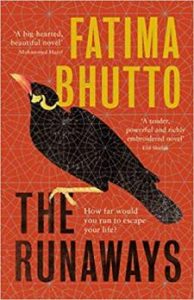 On the other side of Karachi lives Monty, whose father owns half the city and expects great things of him. But when a beautiful and rebellious girl joins his school, Monty will find his life going in a very different direction.
On the other side of Karachi lives Monty, whose father owns half the city and expects great things of him. But when a beautiful and rebellious girl joins his school, Monty will find his life going in a very different direction.
Sunny’s father left India and went to England to give his son the opportunities he never had. Yet Sunny doesn’t fit in anywhere. It’s only when his charismatic cousin comes back into his life that he realises his life could hold more possibilities than he ever imagined.
These three lives will cross in the desert, a place where life and death walk hand in hand, and where their closely guarded secrets will force them to make a terrible choice.
‘Incredibly ambitious, extremely powerful and moving’ – BBC Radio 4
Fatima Bhutto was born in Kabul. She is the author of a book of poetry, two works of non-fiction, including her bestselling memoir Songs of Blood and Sword, and the highly acclaimed novel The Shadow Of The Crescent Moon, which was longlisted in 2014 for the Bailey’s Women’s Prize for Fiction.
Fatima Bhutto
The Runaways
Penguin Books Ltd
Imprint: Viking
Fiction
English
Published: 07/03/2019
ISBN: 9780241346990
Hardcover
Length: 432 Pages
RRP: £14.99
# new novel
Fatima Bhutto
The Runaways
• fleursdumal.nl magazine
More in: - Book News, - Book Stories, Archive A-B, Archive A-B, Art & Literature News, Fatima Bhutto

De vaak gehoorde verspreking ‘op Oerol’ in plaats van ‘op Terschelling’ geeft aan dat Oerol de functie heeft gekregen van een plek. In 2019 kantelt Oerol de perspectieven.
K a n t e l e n d e perspectieven
Oerol laat dit jaar de vergezichten, de perspectieven van de makers, en ook hun zorgen en hoop voor de toekomst zien. Een wereld waarin je wordt uitgedaagd je eigen inzichten tegen het licht te houden. Een tijdelijke samenleving waarin iedere deelnemer telt en de verwondering centraal staat.
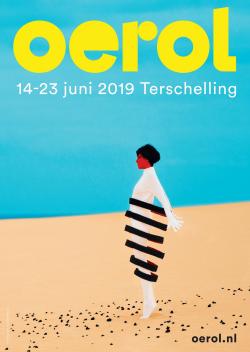 Naast een sterk vernieuwend aanbod van Theater, Pop-up performances en Expedities, is er muziek uit alle werelddelen te beluisteren.
Naast een sterk vernieuwend aanbod van Theater, Pop-up performances en Expedities, is er muziek uit alle werelddelen te beluisteren.
Nieuw dit jaar zijn onder andere de Secret Garden Sessions. Deze concertreeks met neo-klassieke muziek van Nederlandse en buitenlandse artiesten vindt plaats in de idyllische omgeving van Zelfpluktuin Groenhof.
Het geheel van Oerol Talks biedt ruimte voor reflectie voor zowel makers als bezoekers. Ook de kunstvorm spoken-word krijgt een eigen plek in verschillende onderdelen van de programmering.
Oerol 2019 – 14 t/m 23 juni
Oerol is een vrijstaat voor makers en publiek. Al meer dan 37 jaar biedt het festival ruimte voor talentontwikkeling, experiment en dialoog.
# meer informatie op website oerol
• fleursdumal.nl magazine
More in: Art & Literature News, AUDIO, CINEMA, RADIO & TV, DANCE & PERFORMANCE, MUSIC, Natural history, Oerol, STREET POETRY, THEATRE
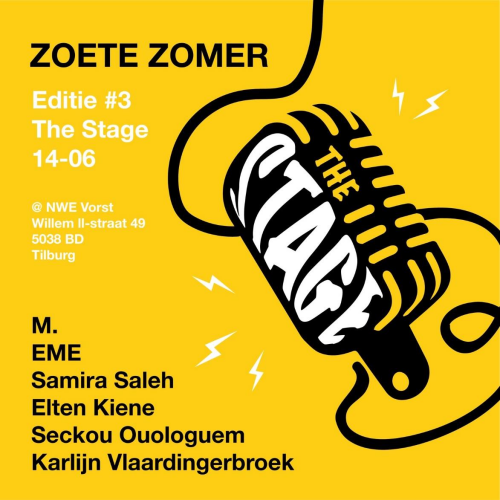
Na de succesvolle tweede editie van The Stage op het Tilt festival 2019, organiseert Onias Landveld, stadsdichter van Tilburg, de laatste Stage van het seizoen.
The Stage is een podium waar verschillende literaire en muzikale artiesten met diverse achtergronden het publiek ontmoeten. Voor de laatste editie is dit keer de tuin van de Nieuwe Vorst het podium. Op 14 Juni om 20.00 uur vindt daar “Zoete Zomer” plaats.
Geheel naar het concept van The Stage zijn er vijf verschillende literaire performances en één muzikale act. Dit keer zal het podium o.a. verwarmd worden met de tonen van funk soul band EME uit België. Op het “warmste” podium van Tilburg staan als literaire/Spoken Word acts ook:
Elten Kiene (Rotterdam)
Elten Kiene is spoken word-artiest, presentator, organisator, rapper en workshopdocent. Hij is medeoprichter en -organisator van het platform Woorden Worden Zinnen (opgericht in 2010) en was onderdeel van het hiphopcollectief Brandwerk. Als spoken word-artiest heeft Elten vele podia betreden, onder andere bij Paginagroots, Mensen Zeggen Dingen en Late Night Poetry Jam.
M. (Rotterdam)
Deze Rotterdammer ziet en vertaald de schoonheid van het hedendaagse. Vertellend over een krantenwijk alsof het een ambacht is of over een blik in iemands ogen alsof we ooit allemaal op die manier uit onze ogen hebben gekeken. M. acteert niet. Hij is op zoek naar het wezenlijke. Zijn poëzie is authentiek.
Samira Saleh ( Antwerpen)
Samira heeft een manier gevonden om haar gevoelens te vertalen naar Spoken Word. Niet alleen haar serieuze teksten bevatten een stevige inhoud, ook haar humoristische teksten geven een diepe boodschap mee voor de goede luisteraar. Ze was deel van het winnende Team Zuid in het Slam ‘t Stad slam Poetry toernooi in Antwerpen en heeft voor verschillende projecten opgetreden over heel België. Zij is winnares van de Bill Award in de categorie spreken en ze was medeorganisator van Mama’s Open mic in Antwerpen. This revolution will not be televised. It will be heard.
Seckou Ouologuem Winnaar Van Dale Spoken Awards 2015 (Antwerpen)
Seckou Ouologuem is een pionier binnen de Vlaamse slam Poetry scene. Hij stond al op verschillende poëzie- en toneelpodia in bijna alle continenten. In 2009 won hij de Kifkif Awards en in 2015 Spoken Van Dale in de categorie lyrics. Naast het geven en organiseren van lezingen, geeft Seckou ook lessen slam, rap en expressie aan (muziek)scholen, universiteiten en gevangenissen.
Karlijn Vlaardingerbroek (Tilburg)
Karlijn (29) is dichter en kunstdocent. Ze schrijft teksten en liedjes over grote en kleine dingen in het leven. Ze maakt het alledaagse bijzonder en benadert serieuze thema’s op een luchtige en speelse manier. Als voormalig lid van de Poetry Circle 013 heeft ze meermalen op verschillende podia in Nederland gestaan. Naast haar voorliefde voor schrijven en performen is zij een drijvende kracht in de organisatie van het Tilburgs Literair podium Woordenaars.
EME (Antwerpen)
Emeraude Kabeya, geboren in Kinshasa, Congo begon op de middelbare school te experimenteren met coverbands en nam deel aan enkele hiphopprojecten. In 2014 werd ze gevraagd om te zingen in een All Star-bluesproject, georganiseerd door de in Leuven gevestigde Radio Scorpio. Dat is waar ze contact maakte met de muzikanten die later haar band werden. Haar lyriek in combinatie met haar geweldige soulstem, die zowel zacht als krachtig klinkt, sloegen bij de 6 andere muzikanten in als een bom. EME brengt “Soul ‘n’ B”: een mix van soul en R & B met een funky smaak en een vleugje rock. Live neemt de band de taak op zich om mensen te laten dansen, van headbangen tot slijpen. In 2015 won EME de publieksprijs van Rockvonk en in hetzelfde jaar haalden ze de shortlist van ‘De Nieuwe Lichting’ van Studio Brussel. De laatste beschreef haar geluid als pakkend, funky en sensueel.
Onias Landveld, stadsdichter van Tilburg, organiseert ‘Zoete Zomer’, de 3e editie van The Stage
De Nieuwe Vorst
Willem II-straat 49
5038 BD Tilburg
Kaarten & info
013 – 532 85 20
info@denieuwevorst.nl
# meer informatie op website de nieuwe vorst
• fleursdumal.nl magazine
More in: Archive K-L, Art & Literature News, City Poets / Stadsdichters, Landveld, Onias, Literary Events, MUSIC, STREET POETRY, THEATRE

# more on website poetry international festival
More in: #More Poetry Archives, Art & Literature News, AUDIO, CINEMA, RADIO & TV, Literary Events, MODERN POETRY, Poetry International, REPRESSION OF WRITERS, JOURNALISTS & ARTISTS, STREET POETRY, THEATRE
Gilles Speksneijder, een weinig uitgesproken man, bekleedt een bescheiden functie in een dienstverlenende organisatie.
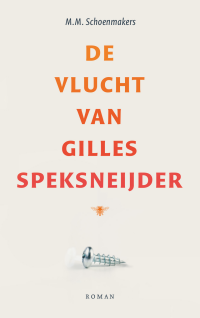 Als hij van de ene op de andere dag wordt gepromoveerd tot assistentverhuiscoördinator, bezwijkt hij bijna onder zijn verantwoordelijkheden en taken. De tijdsdruk neemt toe en het verhuisproces raakt vertroebeld door machtsspelletjes, vileine roddels en complotten.
Als hij van de ene op de andere dag wordt gepromoveerd tot assistentverhuiscoördinator, bezwijkt hij bijna onder zijn verantwoordelijkheden en taken. De tijdsdruk neemt toe en het verhuisproces raakt vertroebeld door machtsspelletjes, vileine roddels en complotten.
Wanneer Gilles uit schimmige motieven een jonge vrouw meebrengt, een antikraakwacht die het verhuisproces dreigt te vertragen, verschuiven de verhoudingen in huize Speksneijder: terwijl Gilles naar de marge wordt gedrongen, neemt zijn vrouw steeds meer het heft in handen.
M.M. Schoenmakers werd geboren in Den Bosch (1949), studeerde af aan de Universiteit van Tilburg en vertrok in 1977 naar Suriname, waar hij werkte met indiaanse gemeenschappen in het binnenland. In 1989 keerde hij terug naar Nederland. Zijn Surinaamse jaren leidden tot vijf romans, die in de periode 1989-1998 bij De Bezige Bij verschenen. Na een lange stilte verscheen in 2015 opnieuw werk van zijn hand, de alom geprezen roman De wolkenridder. In februari 2019 verscheen de ontroerende en geestige roman De vlucht van Gilles Speksneijder.
Auteur: M.M. Schoenmakers
Titel: De vlucht van Gilles Speksneijder
Literaire roman
Taal: Nederlands
Paperback
256 pagina’s
Uitgever De Bezige Bij
2017
EAN 9789023454076
€ 21,99
# new novel
schoenmakers mm
de vlucht van Gilles Speksneijder
• fleursdumal.nl magazine
More in: - Book News, Archive S-T, M.M. Schoenmakers
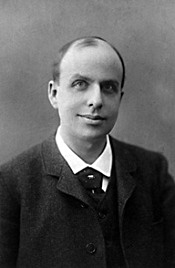
Les Remorqueurs De Macchabés
Allons, Polyte, un coup de croc:
Vois-tu comme le mec ballotte.
On croirait que c’est un poivrot
Ballonné de vin qui barbote;
Pour baigner un peu sa ribote
Il a les arpions imbibés:
Mince, alors, comme il nous dégote,
Pauv’ remorqueurs de macchabés.
Allons, Polyte, au petit trot,
Le mec a la mine pâlotte:
Il a bouffé trop de sirop;
Bientôt faudra qu’on le dorlote,
Qu’on le bichonne, qu’on lui frotte
Les quatre abatis embourbés.
Vrai, dans le métier on en rote.
Pauv’ remorqueurs de Macchabés.
Allons, Polyte, pas d’accroc,
Tu pionces plus qu’une marmotte,
Nous pinterons chez le bistro:
Le nouveau dab de la gargote
A le nez comme une carotte
Pour tous les marcs qu’il a gobés.
Un verre, ça vous ravigote,
Pauv’ remorqueurs de macchabés!
ENVOI
Prince, Polyte de la flotte,
Plus boueux que trente barbets,
Nous vivons toujours dans la crotte,
Pauv’ remorqueurs de macchabés!
Marcel Schwob
(1867-1905)
Les Remorqueurs De Macchabés
• fleursdumal.nl magazine
More in: Archive S-T, Archive S-T, Marcel Schwob
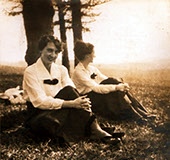
Compensation
You never told me, never, yet I know
You hold a sadness in disguise, unseen
Behind the days and years that intervene
Since you renounced ambition long ago.
Whence comes the tender love that you bestow
To feed our loves? Behind your self serene
There burns a golden passion, how you screen
With radiant life the flame you must forego !
Then you assume our love is ample meed,
Atonement, oh ! I wonder any deed
Of ours can ease your spirit s lassitude,
Or lift your lonely heart ! Our stars elude
Your sun that made them bright your solitude.
Deprived, no boon avails to fill your need.
Gladys Cromwell
(1885-1919)
Compensation
From: Songs of the Dust, 1915
• fleursdumal.nl magazine
More in: Archive C-D, Cromwell, Gladys, Gladys Cromwell
Thank you for reading Fleurs du Mal - magazine for art & literature